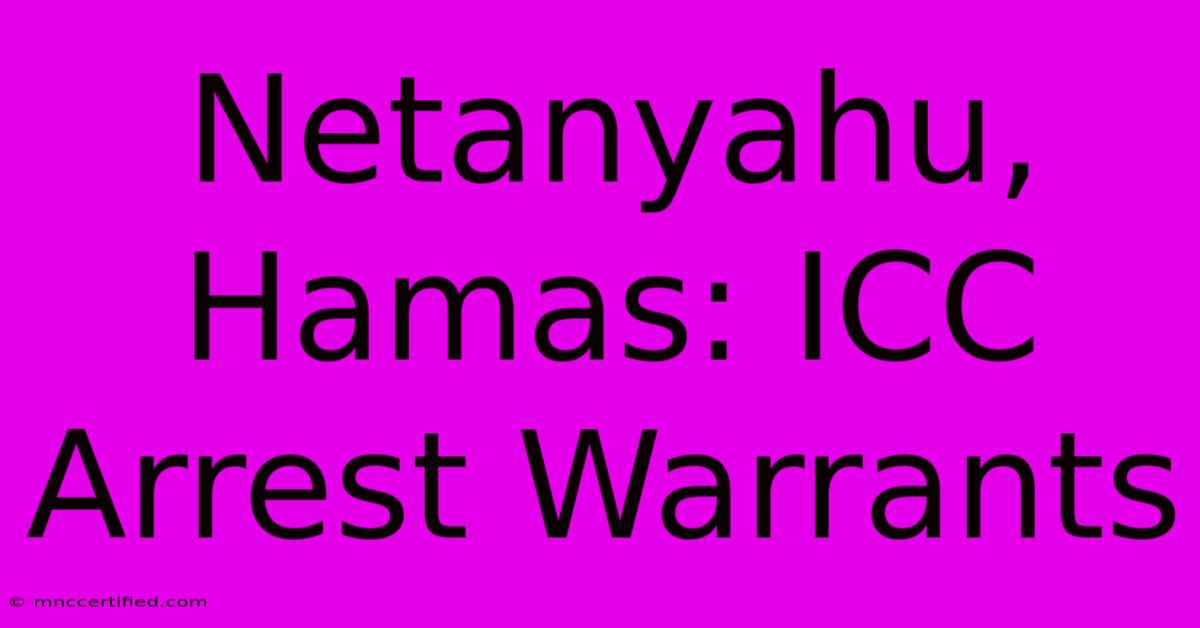Netanyahu, Hamas: ICC Arrest Warrants

Table of Contents
Netanyahu, Hamas: ICC Arrest Warrants – A Deep Dive into the International Legal Implications
The recent issuance of arrest warrants by the International Criminal Court (ICC) against both Israeli Prime Minister Benjamin Netanyahu and Hamas leaders has sent shockwaves through the international community. This complex situation raises crucial questions about international law, the ICC's jurisdiction, and the potential ramifications for the Israeli-Palestinian conflict. This article will delve into the specifics of the warrants, the legal arguments surrounding them, and their potential impact on the ongoing conflict.
Understanding the ICC Arrest Warrants
The ICC, established in 2002, aims to prosecute individuals for the gravest crimes under international law: genocide, war crimes, crimes against humanity, and the crime of aggression. The warrants issued are not a light matter; they represent a significant step towards holding individuals accountable for alleged atrocities.
While the specifics of the accusations against Netanyahu and Hamas leaders remain partially undisclosed due to ongoing investigations, the warrants generally allege violations of international humanitarian law during the conflict. This could include accusations of war crimes, such as targeting civilians, using disproportionate force, or employing prohibited weapons. Crimes against humanity accusations might focus on widespread or systematic attacks against a civilian population.
Netanyahu's Alleged Crimes
The accusations against Netanyahu likely stem from the Israeli military operations in Gaza, particularly those involving civilian casualties. The ICC's focus will likely scrutinize the proportionality of military actions, the measures taken to protect civilians, and the investigation into alleged war crimes committed by Israeli forces. The exact details remain under seal pending further investigations but the warrants represent a serious challenge to Israel's narrative of self-defense.
Hamas's Alleged Crimes
Similarly, the warrants against Hamas leaders center around allegations of war crimes and crimes against humanity committed during the same conflict. The ICC is likely investigating Hamas's rocket attacks against Israeli civilian populations, the use of human shields, and other actions violating international humanitarian law. The targeting of Israeli civilians, regardless of the context of conflict, is a significant breach of international law.
The Legal Arguments and Challenges
The ICC's jurisdiction in this context is a major point of contention. Israel is not a member state of the Rome Statute, the treaty establishing the ICC. However, the ICC asserts jurisdiction based on the principle of territoriality—the alleged crimes occurred within the Palestinian territories, which have declared acceptance of the Court's jurisdiction. This claim is fiercely contested by Israel, which argues the court lacks the authority to investigate its actions.
Arguments against ICC jurisdiction often center on the claim that the ICC is politically biased and unfairly targets Israel. Proponents of this view highlight the disproportionate attention given to the Israeli-Palestinian conflict compared to other conflicts around the globe.
Arguments supporting ICC jurisdiction emphasize the universality of international law and the need to hold all perpetrators of war crimes accountable, regardless of their nationality or the political context. Supporters highlight the importance of independent international bodies investigating such serious allegations, ensuring justice for victims.
The Potential Impact and Implications
The issuance of these warrants has far-reaching implications. It could significantly impact the ongoing Israeli-Palestinian conflict, potentially escalating tensions and undermining peace efforts. The warrants also raise broader questions about the role of the ICC in addressing international crimes and the limits of national sovereignty.
- Political Ramifications: The warrants could affect diplomatic relations and international cooperation. Israel's response will be crucial in shaping future interactions with the international community.
- Legal Precedents: The outcome of the ICC investigations will set significant legal precedents, influencing how international humanitarian law is interpreted and applied in future conflicts.
- Impact on Peace Negotiations: The warrants could complicate already fragile peace negotiations, creating further obstacles to a lasting resolution of the conflict.
Conclusion:
The ICC arrest warrants against Netanyahu and Hamas leaders represent a landmark moment in the Israeli-Palestinian conflict. The legal arguments and the potential political repercussions are immense. The situation demands careful consideration of international law, the role of international justice mechanisms, and the need for accountability for serious human rights violations. The ongoing investigations and any subsequent trials will undoubtedly shape the future trajectory of the conflict and the international legal landscape. This is a developing story with significant implications for the region and the world.

Thank you for visiting our website wich cover about Netanyahu, Hamas: ICC Arrest Warrants. We hope the information provided has been useful to you. Feel free to contact us if you have any questions or need further assistance. See you next time and dont miss to bookmark.
Featured Posts
-
Affordable Insurance Belle Glade
Nov 22, 2024
-
Berkshire Life Insurance Company
Nov 22, 2024
-
Online Insurance Adjuster Course
Nov 22, 2024
-
Snowflake Stock Jumps Reasons Why
Nov 22, 2024
-
Loan Signing Agent E And O Insurance
Nov 22, 2024